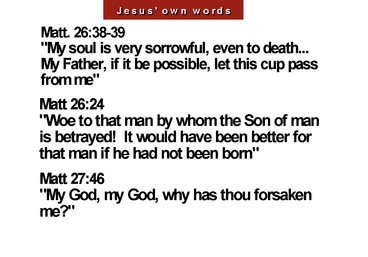 |
 |
Jesus, in his final prayer given in the garden of Gethsemane prayed, "My soul is very sorrowful, even to death ... My Father, if it be possible, let this cup pass from me" (Matt. 26:38-39). Jesus uttered this prayer, not once, but three times. Many Christians today believe that although his mission was to die on the cross, Jesus uttered this timid prayer out of human or fleshly weakness. But, could Jesus Christ, the savior of mankind, utter any prayer out of weakness'?
Neither the first Christian martyr, Stephen, nor any of the many martyrs who followed ever prayed from such weakness. Did they ever ask, "Let this cup pass from me" as they were dying'? How can we say that Jesus was weaker than these martyrs? Especially if it was his duty and mission to die on the cross, why did Jesus pray this way?
Jesus' prayer in the garden of Gethsemane was not a self-centered or timid prayer, uttered out of fear of dying. If the crucifixion were the only way for Jesus to save mankind, he would gladly have died on the cross hundreds of times over.
Jesus was troubled in thinking about his mission on earth: to restore God's purpose of creation. His heart was so troubled because he knew how God would grieve that he could not complete his mission and that the final salvation of mankind could be prolonged for thousands of years. Jesus also foresaw that his disciples and his other followers, the Christians, would have to meet terrible persecution, even shedding blood as he did on the cross. He also anguished over the troubled future that would befall the people of Israel who had rejected him.
Therefore, in the garden of Gethsemane, Jesus, as a last desperate prayer to God, repeatedly pleaded, "Even in these desperate circumstances, let me remain on earth so that I can continue my mission and change the hearts of the people to accept me."
If dying on the cross was predestined by God, why did Jesus Say to Judas Iscariot, who betrayed him, "Woe to that man by whom the Son of Man is betrayed! It would have been better for that man not to have been born." (Matt. 26:24),
Moreover, how can we explain Jesus' cry on the cross, "My God, My God, why hast thou forsaken me?" (Matt. 27:46).